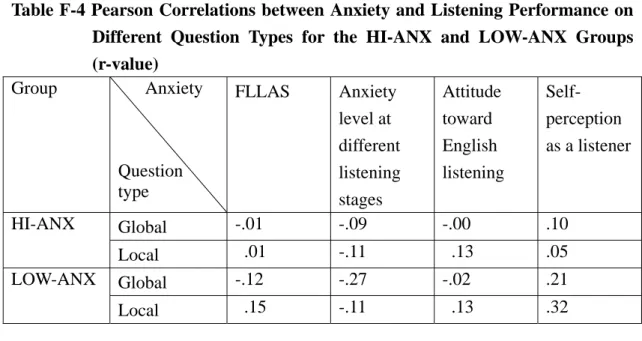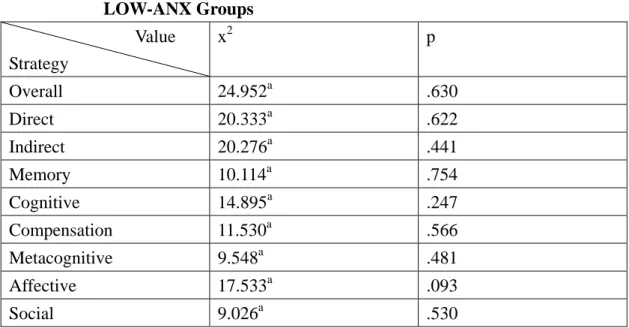APPENDIX A: Foreign Language Listening Anxiety Scale
班級:_____ 座號:_____ 姓名:_____
本問卷旨在了解你對英語聽力的感受,以讓老師更了解你的狀況。問卷結果 對你的成績毫無影響,請安心作答。
仔細閱讀各項敘述,並依你平時聽英語的情況勾選。
非常不同意 不同意 沒意見 同意 非常同意
1.當我不確定是否聽懂英聽內容時,我會覺得很煩或苦惱。 □ □ □ □ □ 2.聽英文時,我常常聽懂單字的意思,但還是沒辦法了解說
話者在說什麼。 □ □ □ □ □
3.聽英文時,我常很困惑以至於我記不起來英聽內容。 □ □ □ □ □ 4.每次要聽一段英文時,我都覺得害怕。 □ □ □ □ □ 5.如果對英聽內容的主題不熟,我聽的時候就會很緊張。 □ □ □ □ □ 6.每次聽到自己不知道的文法,我就會很煩或苦惱。 □ □ □ □ □ 7.聽英文時,如果沒辦法聽懂每一個字,我就會緊張或困惑。 □ □ □ □ □ 8.聽英文時,若遇到我自己沒辦法發音的英文字,我覺得很
困擾。 □ □ □ □ □
9.聽英文時,我通常逐字翻譯聽到的內容。 □ □ □ □ □ 10.當一個人要是聽到那些英文奇怪的發音,就很難記得自
己聽到什麼。 □ □ □ □ □
11.我擔心要聽懂英文必須學的所有新的發音。 □ □ □ □ □
12.我喜歡聽英文。 □ □ □ □ □
13.聽英文時我覺得很有信心。 □ □ □ □ □ 14.人一旦習慣之後,英聽就不會那麼困難。 □ □ □ □ □ 15.學英文最難的部分就是學會聽懂英文。 □ □ □ □ □ 16.要是只要學習英文閱讀而不用學會聽懂英語,我會很開
心。 □ □ □ □ □
17.我不介意獨自聽英文,但是若我必須在一群人中聽英
文,我會很不自在。 □ □ □ □ □
18.我滿意目前我達到的英聽程度。 □ □ □ □ □
Appendix B: Listening Comprehension Test (LCT)
Class: ________ Name: __________ No: _____
本測驗除了測試同學們的英語聽力外,也探討同學們的英語學習背景與在聽英語 的情緒(焦慮)狀況。你的回答除英聽題目外皆不予計分,請誠實作答。
英語學習背景
1. 國中前是否學習過英語?否___;
是___,學習時間共___年___月。
2. 是否到過英語系國家?否___;
是___,目的為(觀光?遊學?居住?其他__),
停留時間共___年___月。
英語聽力試題
A. Best Response 最佳回應句
Choose the best response to each question or statement.
1. (A) Yeah, I also love my meat really crispy.
(B) Don’t worry. I promise that its’ very fresh.
(C) That’s because I forgot to turn off the stove.
(D) Yeah, it’s really soft to chew.
2. (A) Yes. I had to end my relationship with my girlfriend to focus on my studies.
(B) Yes. I was successful without ever really making any sort of effort to succeed.
(C) Yes. I received many awards and benefits for performing my job so well.
(D) Yes. I enjoyed the process of pursuing my goal.
3. (A) Yeah, I’ve never seen anyone so beautiful.
(B) That’s because she went to a good college.
(C) What makes you think she’s impatient?
(D) Then she’s going to need more training.
4. (A) She admires the fact that she’s so smart.
(B) She envies her because she’s so pretty.
(C) She really enjoys playing tennis with her.
(D) She knows her so well because they’re sisters.
5. (A) She’s got a broken collar bone.
(B) She’s suffering from depression.
(C) She’s training for the Olympics.
(D) She’s moving to a new apartment.
6. (A) How long a prison sentence did he get?
(B) I can’t believe he has absolutely no money left.
(C) Oh, I hope no one was injured in the blaze.
(D) Great! I’m glad to hear he finally got promoted.
※ 你認為「最佳回應句」這一大題的難度為:1. 簡單 2. 普通 3. 困難。
________。
※ 請回想一下,你剛剛作答「最佳回應句」大題時,你的焦慮程度為____。
(請填數字,1~5 分別代表由最不焦慮~最焦慮的程度)
1.非常不焦慮 2.不焦慮 3. 沒感覺 4.焦慮 5. 非常焦慮
B. Conversations 會話
Listen to the following conversations, and then answer the questions.
7. (A) More than 90 minutes.
(B) Exactly 90 minutes.
(C) Less than 90 minutes.
(D) About 90 minutes.
8. (A) He has benefited a lot from her success.
(B) He’s opposed to her running her own restaurant.
(C) He helped a lot in making her restaurant a success.
(D) He eats at her restaurant almost every day.
9. (A) He is stammering.
(B) He is yawning.
(C) He is rocking.
(D) He is rolling.
10. (A) His swim made him really hungry.
(B) The water in the river was really warm.
(C) His swim made him feel more lively.
(D) The water in the river looked dirty.
(C) He is of weak mind or body.
(D) He has a lot of curiosity.
12. (A) She took her purse without asking.
(B) She didn’t thank her for the purse.
(C) She said that the woman took her purse.
(D) She refused to borrow her purse.
※ 你認為「簡短會話」這一大題的難度為:1. 簡單 2. 普通 3. 困難。
______。
※ 請回想一下,你剛剛作答「簡短會話」大題時,你的焦慮程度為____。
(請填數字,1~5 分別代表由最不焦慮~最焦慮的程度)
1.非常不焦慮 2.不焦慮 3. 沒感覺 4.焦慮 5. 非常焦慮
C. Short Talks 短文
Listen to the following passages, and then choose the best answer to each question.
Questions 13~15
13. (A) It’s grand and impressive.
(B) It’s old and decayed.
(C) It’s romantic and cheerful.
(D) It’s modern and stylish.
14. (A) Really delicious local dishes.
(B) A lecture on the city’s long history.
(C) Extremely beautiful views of the Old Town.
(D) A wonderful artwork display.
15. (A) As standing out in height.
(B) As buried underground.
(C) As sitting at the top of a hill.
(D) As hidden in a forest.
Questions 16~18
16. (A) Louvre Museum, Jean-Fancois Millet’s wonderland.
(B) A wandering artist, Jean-Fancois Millet.
(C) Jean-Fancois Millet’s artwork.
(D) The contrast between Paris and Barbizon.
17. (A) That Millet’s visits there made him feel ashamed of his own paintings.
(B) That Millet felt the art works on display there were very artificial.
(C) That Millet’s visits there made his life easier and more pleasant.
(D) That Millet thought that his paintings deserved to be displayed there.
18. (A) The wonderful natural scenery of the town.
(B) The genuine and sincere people of the town.
(C) The delicious local food in the town.
(D) The fast pace and excitement of the town.
※ 你認為「短文」這一大題的難度為:1. 簡單 2. 普通 3. 困難。
____。
※ 請回想一下,你剛剛作答「短文」大題時,你的焦慮程度為____。
(請填數字,1~5 分別代表由最不焦慮~最焦慮的程度)
1.非常不焦慮 2.不焦慮 3. 沒感覺 4.焦慮 5. 非常焦慮
Appendix C: Script of and Answers to the LCT
Class: ________ Name: __________ No: _____
Pat I: Script
A. Best Response
Choose the best response to each question or statement.
1. I’m really enjoying this pork chop a lot. It is so tender.
2. Did you have to sacrifice anything to achieve your goal of becoming a doctor?
3. I just met our new executive assistant Ms. Knickerbocker. She is really gorgeous.
4. Why is Margaret so jealous of our new classmate Jennifer?
5. I heard that your sister Rita is seeing a psychologist. What’s the matter with her?
6. I don’t think I’ll be working at my brother’s company anymore. He filed for bankruptcy last week.
B. Conversations
Listen to the following conversations, and then answer the questions.
7. M: What movie did you go to?
W: That new animated film that just came out.
M: Oh, I really want to see that, too.
W: Don’t bother. It’s really boring.
M: Really? How long is it?
W: Approximately 90 minutes.
Q: How long does the woman say the film is?
8. M: Wow, your Italian restaurant is really amazing.
W: Thanks. It took a lot of work to get it up and running.
M: I assume that business has been good since you opened it.
W: Yeah, the restaurant’s full of customers almost every day.
M: I guess I should congratulate you on your achievement.
W: Well, I couldn’t have made it without my husband.
Q: What does the woman say about her husband?
9. W: Hello there, what’s your name?
M: My name’s … my name’s B-, B-, B- Billy.
W: That painting you’ve made is really nice.
M: Well, you ain’t seen … seen … seen no-, no-, no-, nothing yet.
W: Really? Do you have other paintings to show me?
M: Here’s one, here’s one, you’ll … you’ll n-, n-, n- never forget.
Q: What is the man doing?
10. M: Hey Gill, how’s the barbecue coming along?
W: The burgers are almost ready. Where have you been?
M: I went for a swim in the river.
W: But I thought you went take a nap.
M: Sometimes exercise is more refreshing than a rest.
W: Then how was it?
M: Yeah, it was great. Now I’m not sleepy any more.
W: I think I’ll do the same after lunch.
Q: What does the man mean?
11. M: I heard that you’ve adopted a boy from overseas.
W: That’s right. His name is Hamid.
M: What country does he come from?
W: He’s from a poor town in Afghanistan.
M: Interesting. What’s he like?
W: Well, he’s a very fragile boy.
Q: What do we know about Hamid?
12. M: Want to go out to lunch with me and Nancy?
W: No way. I’m not going anywhere with her.
M: Why are you so upset with Nancy?
W: She spoke ill of me behind my back.
M: Are you sure? How did you know?
W: She said her purse was stolen in cooking class when I was present.
M: What would make her think that you did?
W: I have no idea. You’d have to ask her.
Q: What does the woman say Nancy did?
C. Short Talks
Listen to the following passages, and then choose the best answer to each question.
One of the most pleasant surprises during my trip to Germany was the romantic city of Heidelberg. The city, located in the southwest corner of Germany, lies along the banks of the Neckar River. One of the main attractions of the city is the majestic Heidelberg Castle. From the castle, one can enjoy stunning views of the Old Town down below. Walking through the stone-paved alleys of the Old Town, you ca get a feel for the city’s long history. Heidelberg is home to many impressive structures that were built over the centuries, including the towering Church of the Holy Spirit constructed nearly a thousand years ago! A visit to Germany wouldn’t be complete without a stop in Heidelberg.
13. What does the speaker say about Heidelberg Castle?
14. According to the passage, what can you enjoy at Heidelberg Castle?
15. How does the speaker describe the Church of the Holy Spirit?
Jean-Fancois Millet never felt comfortable living in Paris. Born to peasants in a small rural town in Normandy, Millet never got accustomed to the urban life of Paris.
He had moved there at the age of twenty to study art. Millet found that the people and life in Paris were artificial. During this unhappy period in his life, one of the only things that gave Millet comfort was visiting the Louvre Museum. There, he could enjoy the wonderful works of famous painters. Millet would eventually move to the small town of Barbizon. In Barbizon, surrounded by down-to-earth people, Millet felt at home. He would end up spending the rest of his life there.
16. What could be the title for this passage?
17. What does the passage say about the Louvre Museum?
18. According to the passage, what made Millet feel at home in Barbizon?
Par II: Answers
A. Best Response
Choose the best response to each question or statement.
1. (D) Yeah, it’s really soft to chew.
2. (A) Yes. I had to end my relationship with my girlfriend to focus on my studies.
3. (A) Yeah, I’ve never seen anyone so beautiful.
4. (B) She envies her because she’s so pretty.
5. (B) She’s suffering from depression.
6. (B) I can’t believe he has absolutely no money left.
B. Conversations
Listen to the following conversations, and then answer the questions.
7. (D) About 90 minutes.
8. (C) He helped a lot in making her restaurant a success.
9. (A) He is stammering.
10. (C) His swim made him feel more lively.
11. (C) He is of weak mind or body.
12. (C) She said that the woman took her purse.
C. Short Talks
Listen to the following passages, and then choose the best answer to each question.
13. (A) It’s grand and impressive.
14. (C) Extremely beautiful views of the Old Town.
15. (A) As standing out in height.
16. (B) A wandering artist, Jean-Fancois Millet.
17. (C) That Millet’s visits there made his life easier and more pleasant.
18. (B) The genuine and sincere people of the town.
Appendix D: Listening Strategy Use Questionnaire
各位同學:你好!
這份問卷旨在了解你的英語聽力理解策略使用情形,你在問卷所填之資料僅 供本研究用,對你的成績毫無影響,請安心作答。
以下各題的敘述是有關你理解英語聽力內容的敘述,請仔細閱讀每一項,並 依你自己平常聽英語的情形做選擇,在方格中打勾:
總是─我一向或幾乎總是這麼做。
通常─我通常會這麼做。
有時─我有時候會這麼做。
不常─我不常這麼做。
從不─我從未或幾乎沒有這麼做過。
這些題目並沒有對或錯的答案,請依照自己實際的情況詳實作答,謝謝你的 合作與協助!
英語教師 鄭昭慧
總是 通常 有時 不常 從不
1.聽的時候,我將聽到的字依其屬性、類別來分類。(例 □ □ □ □ □ 如聽到許多食物的名稱,就將這些字歸為食物類,並因
此推測這是與食物有關的內容。)
2.將所聽到的內容與我自己的經驗和常識相連,以便了 □ □ □ □ □ 解全文。(例如,在聽有關出國旅遊的內容時,我將正
在聽到的“到紐西蘭與澳洲旅遊”的內容,與我自己對 這兩個國家的認識結合在一起,以了解全文。)
3.在聽的時候,我想像一幅圖像來了解內容。 □ □ □ □ □ 4.在聽的時候,我一邊聽一邊做筆記。(例如: 快速記下 □ □ □ □ □
關鍵字、或一些主要概念。)
5.在聽的時候,我習慣將字詞或句子翻成中文。 □ □ □ □ □ 6.我預測或假設接下來的內容是什麼,然後再確認我的 □ □ □ □ □
預測對不對。
7.當我在練習聽力的時候,我先用字典把生字、片語或文 □ □ □ □ □ 法弄懂了以後再去聽。
8.當我在練習聽力的時候,我會反覆去聽不清楚的字詞或 □ □ □ □ □ 片語等。
9.我用停頓、語氣或語調來猜測聽力內容。 □ □ □ □ □ 10.我用臉部表情、肢體語言來猜測聽力內容。 □ □ □ □ □ 11.我用語言線索(例如: 字首、字根、字尾、句型)來猜測 □ □ □ □ □
聽力內容。
12.在聽的時候,我試著跟上速度。例如,雖然有聽不懂的 □ □ □ □ □ 字詞,我仍然努力跟上速度,不被這些困難擋住,不錯
失掉以下的內容。
13.在聽之前,我先預習內容裡的主要概念,或先將材料 □ □ □ □ □ 瀏覽一次。
總是 通常 有時 不常 從不
14.在聽之前,我會為任務做好準備。(例如,在聽廣播的 □ □ □ □ □ 語言教學節目(如空中英語教室)時,我會先將環境中的
雜音除去,保持房間的安靜,並將需要的文具準備齊 全,等一切就緒以後再開始聽。)
15.我會主動尋找學習英語聽力的方法與練習英語聽力的 □ □ □ □ □ 機會。
16.我會自我檢查是否聽得懂,並試著去改正錯誤的地方。 □ □ □ □ □ 17.在聽的時候,我鼓勵自己、對自己說“我是對的”、“我 □ □ □ □ □
知道”等來使自己安心。
18.在聽的時候,我深呼吸、放鬆來避免自己緊張。 □ □ □ □ □ 19.練習完聽力後,我會給自己一些獎賞(例如: 吃東西或 □ □ □ □ □
聽聽音樂) 。
20.我會與他人談論或寫下自己學習英語聽力的感覺或 □ □ □ □ □ 困難,以減少壓力或增進學習興趣。
21.當我聽不懂某人對我說的英文時,我會要求他放慢速 □ □ □ □ □ 度、重覆、解釋或向對方確認自己的理解是否正確。
22.當我有聽不清楚的地方,我會問同學或老師,來幫助 □ □ □ □ □ 了解。
23.我會和同學或朋友一起從事加強英文聽力的活動。 □ □ □ □ □ 24.我會試著去體會說話者的心情或感覺,來幫助了解說 □ □ □ □ □
話內容。
問卷結束!
謝謝你的合作!
Appendix E: Interview Questions
1. 你聽英文時會覺得焦慮嗎?為什麼?
2. 你對於「最佳回應句」、「簡短會話」和「短文」這三大題的感覺為何?聽哪
一大題最不令你焦慮?聽哪一大題最令你焦慮?為什麼?這樣的情況對你的
影響為何?你通常如何處理這樣的情況?
3. 你通常使用的聽力策略為何?(請受試者舉具體的例子說明)
Appendix F: Results in Sections 4.1 ~ 4.3
Table F-1 Pearson Correlations between Anxiety and Listening Performance (r-value)
Anxiety
Listening performance
FLLAS Anxiety level at different
listening stages
Attitude toward English listening
Self-perception as a listener
LCT -.29** -.37** -.14 .06
Table F-2 Pearson Correlations between Anxiety and Listening Performance of the HI-ANX and LOW-ANX Groups (r-value)
Group FLLAS Anxiety level at different
listening stages
Attitude toward English
listening
Self-
perception as a listener
HIGH-ANX .001 -.112 .075 .092
LOW-ANX .034 -.223 .072 .323
Table F-3 Pearson Correlations between Anxiety and Listening Performance on Different Question Types (r-value)
Anxiety
Question type
FLLAS Anxiety level at different
listening stages
Attitude toward English listening
Self-perception as a listener
Global -.35** -.40** -.19* -.01
Local -.17 -.26** -.06 .11
Table F-4 Pearson Correlations between Anxiety and Listening Performance on Different Question Types for the HI-ANX and LOW-ANX Groups (r-value)
Group Anxiety
Question type
FLLAS Anxiety level at different listening stages
Attitude toward English listening
Self- perception as a listener
Global -.01 -.09 -.00 .10
HI-ANX
Local .01 -.11 .13 .05
Global -.12 -.27 -.02 .21
LOW-ANX
Local .15 -.11 .13 .32
Table F-5 Pearson Correlations between the FLLAS and Anxiety Recall of Different Text Types
Text type Value
Statements Conversations Short talks
r .29 .32 .21
p .001** .000** .016*
Table F-6 Pearson Correlations between the FLLAS and Subjects’ Performance on Different Text Types
Text type Value
Statements Conversations Short talks
r -.28 -.13 -.22
p .001** .145 .010**
Table F-7 Pearson Correlations between the Subjects’ Anxiety Recall and Listening Performance on Different Text Types
Text type Value
Statements Conversations Short talks
r -.36 -.20 -.12
p .000** .020* .163
Table F-8 Pearson Correlations between the Subjects’ Anxiety Recall and Listening Performance on Different Text Types for the HI-ANX and LOW-ANX Groups
Group Text type
Value
Statements Conversations Short talks
r -.42 .14 -.10
HIGH-ANX
p .021* .470 .612
r -.38 -.45 -.12
LOW-ANX
p .040* .014* .515
Table F-9 Chi-Square Test of Overall Strategy Use by the HI-ANX and LOW-ANX Groups
Value Strategy
x2 p
Overall 24.952a .630
Direct 20.333a .622
Indirect 20.276a .441
Memory 10.114a .754
Cognitive 14.895a .247
Compensation 11.530a .566
Metacognitive 9.548a .481
Affective 17.533a .093
Social 9.026a .530
Table F-10 Chi-Square Test of Each Strategy by the HI-ANX and LOW-ANX Groups
Value Strategy
x2 p
MM1 .853a .931
MM2 .973a .914
MM3 2.821a .588
MM4 2.658a .617
CG1 18.254a .001**
CG2 1.658a .798
CG3 12.589a .013
CG4 5.173a .270
CP1 4.500a .343
CP2 8.032a .090
CP3 5.109a .276
CP4 8.662a .034*
MT1 6.202a .185
MT2 2.450a .484
MT3 3.780a .437
MT4 2.500a .645
AF1 6.886a .076
AF2 9.409a .052
AF3 2.220a .695
AF4 1.352a .852
SC1 4.271a .371
SC2 2.247a .690
SC3 .377a .945
SC4 8.684a .070



